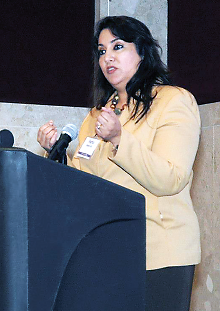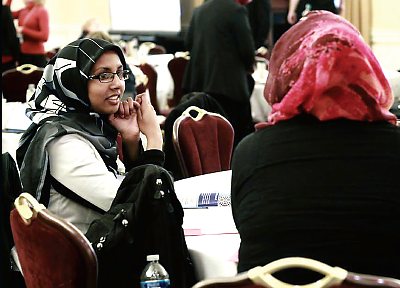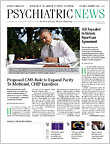Farha Abbasi, M.D., was puzzled by an anomaly she observed during her psychiatry residency at Michigan State University. Michigan has one of the largest Muslim populations in the United States, but she was seeing disproportionately few Muslim patients.
“People certainly needed help,” she said in a recent interview, recounting stories she had heard informally of troubled siblings or parents. “The problems were there, but people were not accessing care.”
So when Abbasi was awarded an APA Substance Abuse and Mental Health Services Administration (SAMHSA) Minority Fellowship in 2009, she used it as a stepping stone to address that particular disparity.
Abbasi was born and went to medical school in Pakistan, came to the United States in 2000, and finished her residency in 2010. Today she is a clinical assistant professor of psychiatry at Michigan State and staff psychiatrist at the university’s student health center.
The fellowship “completely turned my life around,” said Abbasi, who credits former Office of Minority and National Affairs Director Annelle Primm, M.D., M.P.H., as a great mentor.
“She was generous with her time and gave us a trajectory and guidance,” recalled Abbasi. “I had a vision but I had no idea how to implement it until I had those discussions with her.”
The fellowship helped her organize the Muslim Mental Health Conference, an event that has been repeated every year since, most recently in March in Dearborn, Mich. There had been previous similar efforts but they concentrated more on academic research, and Abbasi wanted to focus more on services and community engagement, she said. Doing so meant addressing some familiar obstacles.
“There is stigma surrounding mental illness and mental health care generally in the United States, but that is especially marked in faith-based communities of any kind,” she said. “Too often mental illness is seen as spiritual weakness or a failure to pray hard enough.”
Yet contemporary concepts of mental health are not historically absent from Islam. Diagnoses like obsessive-compulsive disorder were described in medical literature in the Muslim world before they appeared in the West, said Abbasi. Constructs expressed within the religion as soul or mind or heart have analogues in modern psychological thinking.
“So if someone really needs therapy in that religious terminology, it can be easily translated,” she said. Muslim prayer, for instance, includes both physical components and mindfulness. That combination can be understood as reflecting hygienic reasoning incorporating both personal wellness and communal welfare.
Complicating her mission was the fact that the Muslim community in the United States is quite diverse. Besides immigrants from many different countries in South Asia, the Middle East, and Africa and their children, there are African-American Muslims, and converts to the religion—all of whom face their own special circumstances that can influence their mental states. Beyond their various geographic origins, immigrants and refugees may have survived violence and trauma in their home countries and then must deal with adjusting to American society.
“There may also be intergenerational trauma, as children of immigrants learn to navigate bicultural identities, especially in the face of stereotypes or discrimination,” said Abbasi. “But even with that diversity, conference participants do feel a connection because of the faith we share.”
The conference has grown steadily since the first one in 2009.
“There is no topic that we have not discussed at some point over those seven years,” she said. “We create a safe zone where people can connect and tell their stories as well as present research.”
Abbasi wants to expand her conversation beyond the conference by increasing cultural sensitivity on the part of clinicians. To that end, she is teaching her colleagues about Islam and the cultures of the people who practice it. And she has seen another change: More Muslim students now come into the student health center at MSU, more open to seeking help. ■
More information on the Muslim Mental Health Conference can be accessed
here.


